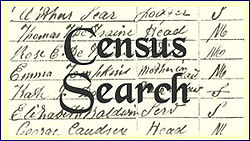Difference between revisions of "Census Search"
m |
|||
| Line 6: | Line 6: | ||
The census can be the most effective way of following an ancestor who moved across the country (perhaps due to work for example). The place of birth is recorded on census returns but is lacking on many other documents. Many mariners and soldiers would simply be impossible to find easily without census returns, due to the transient nature of their employment. | The census can be the most effective way of following an ancestor who moved across the country (perhaps due to work for example). The place of birth is recorded on census returns but is lacking on many other documents. Many mariners and soldiers would simply be impossible to find easily without census returns, due to the transient nature of their employment. | ||
| − | Searching the census may appear easy to do, but often an ancestor can be difficult to locate for several reasons. Mostly the problem is due to a | + | Searching the census may appear easy to do, but often an ancestor can be difficult to locate for several reasons. Mostly the problem is due to a mis-transcribed name, or errors which can occur in the original documents or when the index is compiled. It is best to view the image whenever possible to verify what has been recorded, as the index and image may have conflicting details. |
By following the illustrated techniques below, you can see how to locate your ancestors in the census and follow some proven methods to help find those missing census images. | By following the illustrated techniques below, you can see how to locate your ancestors in the census and follow some proven methods to help find those missing census images. | ||
Revision as of 16:28, 25 June 2007
The Census
The census is one of the most useful sets of records available. Placing an ancestor with their parents and siblings when they are young, or finding them in later life with a spouse and children are just a few of the things that can be discovered.
The census can be the most effective way of following an ancestor who moved across the country (perhaps due to work for example). The place of birth is recorded on census returns but is lacking on many other documents. Many mariners and soldiers would simply be impossible to find easily without census returns, due to the transient nature of their employment.
Searching the census may appear easy to do, but often an ancestor can be difficult to locate for several reasons. Mostly the problem is due to a mis-transcribed name, or errors which can occur in the original documents or when the index is compiled. It is best to view the image whenever possible to verify what has been recorded, as the index and image may have conflicting details.
By following the illustrated techniques below, you can see how to locate your ancestors in the census and follow some proven methods to help find those missing census images.
Have a look at the Records Office Guide for more information about the census records.
The Illustrated Guide to Census Returns
- Searching a census on ScotlandsPeople Page to come
If you still can't find those missing families, you may find these Wiki pages useful:
Useful Links and Sources
- For a very useful tutorial on reading old handwriting and what you will find on a census return: Techniques for Reading Difficult Writing in a Census
- When you have tracked down your ancestors in the Canada 1881, British 1881 or US 1880 Census you might like to enter them on the Lost Cousins website. Just enter your ancestors - then click the Search button!
Back to Main Page
